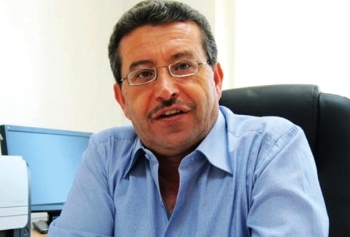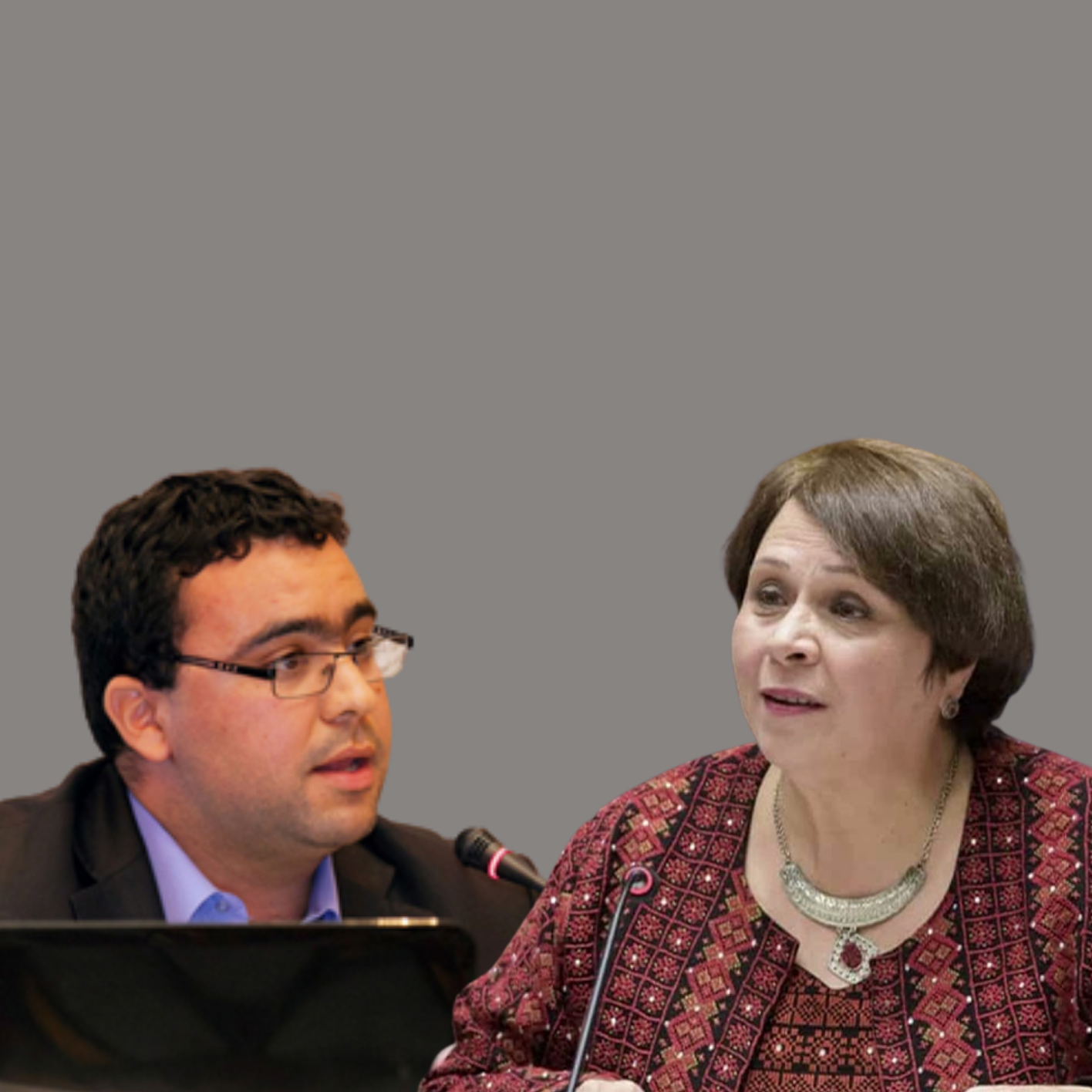
Introduction
Dr. Nasr Abdel Karim professor of finance and economics in the graduate studies department at the Arab American University – Ramallah described the Israeli government decision to withhold the PA’s tax returns [which it collects on its behalf] as the embodiment of Israeli Prime Minister Benjamin Netanyahu’s vision based on employing economics in political blackmail to force the Palestinians to make concessions. He warned of the impacts the financial crisis on the PA and how this will impact the various sectors of Palestinian society, especially the families of civil servants and the most marginalized and vulnerable families and those who receive monthly assistance from the government.
In an interview with “Hosted by MIFTAH”, Dr. Abdel Karim says successive Palestinian governments have never had a strategy to deal with economic crises and did not manage these crises well.
Following is the full text of the interview:
**What are the projected economic impacts on Palestinians from Israel’s decision to withhold the PA’s tax returns? What service sectors will be most hit by the austerity policy the government announced? How will this crisis reflect on the private sector?
No doubt, the families of government employees who are being paid half their salaries will be directly impacted. This situation could last for several more months, which will result in these families being incapable of consumption and of meeting their basic needs or fulfilling their commitments. Thus, this direct impact will be projected on the overall economic situation since we are talking about gradually decelerating commercial activity in addition to other economic cycles connected. Eventually, this will prompt the affluent to be more cautious towards investment, which will of course complicate the overall situation and heighten the financial crisis. This is why individuals will be affected and not just employees, in addition to the private sector in its dealings with the government, which sells merchandise and services. Furthermore, there are suppliers who, if their dues are late more than once, means they will lose their ability to continue working and could be laid off. Still the biggest sector that will be systematically impacted is the most marginalized and vulnerable sector of society: the families who receive social assistance and who used to receive NIS750 every three months depending on cash flow availability. Also, the families of civil servants will be greatly impacted because the income of these families is limited. However, they may have other options to turn to. Additionally, the merchandise of suppliers will be impacted as will services such as communications and transportation in addition to basic services such as food and commerce.
I think we are not going to see the brunt of the impact just yet but only after people lose all other options and exhaust every resource they have. Hence, the impact of the crisis will be clearer in the coming months. This begs the question: How ready is Palestinian society to face such a crisis? I think it is very weak.
**Do you think this Israeli move is temporary or will it take root in the Palestinian economy?
I think this is part of Israeli Prime Minister Benjamin Netanyahu’s systematic strategic framework in coordination with US President Donald Trump. This measure began in the context of economic pressure on the Palestinians in both the West Bank and the Gaza Strip and not within a framework of an altercation with the PA. Rather, it is a vision that has to do with a historic settlement to the conflict, one which Netanyahu sees from the perspective of employing economics in political blackmail in order for force the Palestinians to make compromises. In this sense, it is not isolated from the other strategic approaches of the right-wing government in Israel.
**How linked is this economy to the Paris Protocol and the restrictions imposed on the Palestinian economy, which give preference to the occupation in controlling our people’s capacities and capabilities?
The problem is not only with the Paris Protocol. I wish this agreement was implemented, but Israel is not abiding by it. The fundamental problem is in the Oslo Accords, which put us in this box. Israel dismantled this agreement in 2000 and only preserved the measures that served its interests; therefore it is not about to dissect this agreement into partial agreements. Rather it is looking to impose a political settlement, since at present it has a golden opportunity to do so. The Arab countries are fragile, weak and disunited and posing no objections. Israel is scaring them with the Iranian boogieman and with the divisions of the so-called Arab Spring. Anyway, the world is busy with its own issues. There is a division of roles between the various poles in this world and the Palestinians, as you can see, are in the worst and weakest situation politically, institutionally and economically . Meanwhile, Netanyahu believes having Trump around is the best possible scenario. That is why we are making no indication to enter into partial negotiations that could send the wrong political message - that we support a relationship within a political framework based on an economic relationship with the occupation.
Israel has another approach in this regard; a strategic plan. The fear is not what is happening now, but what will happen later, namely when the time comes for implementing the ‘deal of the century’ and also when Trump’s election campaign begins next November, followed by US elections a year later. During this time, the deal of the century would have matured and the time would have come for it to be put into effect and who will pay the price for it? I believe it will be the Palestinians through political and economic pressures that will be put on them all while the security situation remains in place. This is the problem we will face, especially since Israel has the necessary tools for completely suffocating the Palestinians, eventually leading to the collapse of the PA.
**What steps can the government take to deal with the current financial crisis in light of the withheld tax returns?
The government is only prepared to deal with these developments at the political and media level more than in actuality. It is very clear that managing Palestinian affairs has not changed but is more improvisation and knee-jerk reactions without any planning or prior vision. We all know that the [Israeli] law for withholding PA money was passed in July of last year and we know that Trump is hostile to the Palestinians and wants to cut all assistance to them. We also know that Netanyahu is about to take even more steps. We, however, talk a lot and do nothing. Hence, it was clear that the government was not expecting President Abbas’ decision not to accept all of the PA’s tax returns being held by Israel. This took them by surprise even more than Netanyahu’s decision to do so. This is because his decision to deduct NIS40 million a month from these dues would not make much of a dent at the financial level. The big surprise for the government, however, was the President’s political stance of refusing to take any penny of the tax returns, which threw them for a loop. This is at a time when the government was preparing for other steps but could no longer carry them out after President Abbas’ decision. This, I believe, reflects a problem in the management of the crisis, much like the recent social security law crisis. While there really was a crisis, what was worse was how we managed it. The same applies here in terms of the tax returns. We are constantly living through crises at different times but we do not manage them well.
**Does the PA, represented by the government, have any alternatives for facing these crises? What are they?
All of the alternatives they propose are political and technical ones, which could alleviate some of the repercussions of the problem in terms of its cost and liabilities, but will absolutely not solve the core crisis, or the root of the problem. This means the crisis will repeat itself in another form later on. The problem is about sound crisis management, which would allow us to overcome problems without paying a huge political price. There are well-known technical solutions. The government can cut back, but so far it has not announced any austerity plans. At times when expenditures were increasing, they would verbally announce austerity plans, but without a calculated plan. This requires an agreed-on plan and a consensus over priorities. It needs real and actual steps to improve collection from sectors that evade taxes and smuggle in Israeli products. The government needs to broach the possibility of reviving other mechanisms to get international aid that would guarantee cash flow to the PA until the problem with Israel is solved. If these alternatives do not succeed, the government must resort to a loans-management relationship with banks, which is a kind of tactical management; that is, they would take out a loan in one month and later pay part of that loan.
I think the correct path the government should take is financial. This would require looking at the budget to see where it can make cuts. How big are its revenues? If it continues the same method of managing public affairs without seriously looking into solutions, I think the crisis will escalate. With every passing day, there will be a victim paying the price. The government will eventually exhaust all of its options and resources and the problem will become even more complicated. If we don’t treat the problem right now, we will find ourselves in a situation that could lead to reactions and perhaps even chaos and internal unrest, like what happened in 2006. This could then shift to a confrontation with Israel, which is something Israelis fear.
**Does the PA have mechanisms and strategic solutions it could use in responding to Israeli steps like investing and motivating production sectors such as the agriculture and industry sectors?
Today there is a hemorrhaging that we need to stop. We cannot treat a malignant disease as long as there is bleeding. In parallel, there have been over 25 years of economic policies that have overall resulted in the neglect of agricultural and industrial production. We will need time before we get back to giving real consideration to these sectors. We need to direct more attention to agriculture, industry and internal tourism and turn the compass towards those who work in these sectors so they can succeed. This would in turn, promote food security for Palestinians and reinforce an ability to control production inputs and prices of goods. It would also promote financial sustainability because it would decrease dependency on the clearing tax as a source of income given that importing from Israel and from abroad increases the clearing tax. In addition, this would create job opportunities since these are the sectors most capable of creating jobs.
Strategically, this can be achieved but it needs resources and capabilities. There must also be a roadmap that includes farmers’ and industrialists’ unions and economic scholars. But we really must pay more attention to this and begin finding other ways to succeed, such as talking about raising the value of imports to over $1 billion. We must go back to the land and solve the problem of imports instead of sufficing with exports from which a few large companies abroad benefit. We must guarantee that small farmers also benefit, owners of small workshops and small restaurant owners, all through the three abovementioned sectors. If we benefit these people, this would solve the problem of imports. We would have an import substitution policy and therefore stop importing so much, therefore providing us with hard currency. It would also create serious investment opportunities for citizens. While it is fine that we give attention to exporting our goods, which are very unique such as stone, marble and medicinal herbs, which a small group benefits from, our priority should be in supporting Palestinian products in the local market.
**But can this be achieved while Israel continues to occupy Palestinian land, build settlements, confiscate land and prevents us from benefiting from our own natural resources?
I think this is possible; at least it is better than the current situation. People may say that ‘there is no development under occupation.” I believe that development is not absolute. There may not be 100% development but there will be some percentage of development for sure. Success is relative. We need to get back to the situation we were in prior to the establishment of the PA. The revenues from the agriculture and industry sectors was 60%. People used to depend on agriculture and small traditional family industries.
Today, when we look at the agricultural sector, we find that its contribution is less than 3% of the GDP and when we look at the budget allocated for it, it does not exceed 0.07%. Meanwhile, investment in this sector is decreasing with the exception of the Jordan Valley where large corporations found opportunities in produce such as herbs and dates. Contrary to this, the agricultural spaces have begun to disappear. Hence, we must focus on our products and on creating what is called an agricultural calendar, linked to geographic seasons. We must also try to offer more technical support for farmers as much as possible including the distribution of seeds, fertilizer and medicines, and open paths for them in markets so we can import their products via a marketing network. This will allow them to lead a dignified life and also uphold their own prices instead of doing this through middlemen who currently benefit from much higher pricing. What’s important is that we start to think about this. I am confident we will take several steps forward if we do. The opportunity is there, and even though it is limited, it is one we have not yet tapped into.
**How feasible is it for the PA to confront this blackmail by halting security coordination and taking other steps on the ground to prevent the occupation from being in control of the tax revenues, for example?
It could do this, but we don’t know how successful this will be. Israel has no problem with giving the PA ‘economic facilitations’, if the latter considers bargaining on the issue of security coordination. Israel’s main issue is with security and the rule it bases its actions on is one of “security for economy”. This is the economic peace Israel is working towards. As for the equation of “land for peace” , it ended long ago for Israel. If the issue of bargaining over security coordination for economic steps is proposed, Israel will offer these facilitations, but it will demand that the Palestinians make more efforts on the issue of security. There is a false claim some are making that Israel is economically benefiting from the West Bank and that its economy cannot withstand much, ,like in 2001 when it cancelled its economic relations with the Palestinians and kicked out all the workers from inside Israel. The fact is, Israel has a $360 billion economy, which is highly dynamic and only operates on added value. It has economic relations with the Palestinians and employs them only to the extent that this serves its security and strategic and political interests.
**So, you’re saying the PA has no strategy for facing all of this?
This is not the first time the PA faces a crisis. We had one in 2012 when we went to the UN and then in 2015. Our problem is we take the easier way out by taking out loans or deferring payments to intermediates or employees. Then, when the donor money comes back in and the Israeli government backtracks on its measures and the crisis is resolved, we go right back to our old ways. Strategically, we have no solution and if we want to have one, we must decide the following: Are we willing to be involved in an all-out confrontation with the Israelis on the ground and also be willing to pay the economic price of this confrontation? If so, this all-out confrontation could create new partners which will either impose new relations or maintain the status quo. If we stay the same, there is no strategic option. Creating strategic options demands the destruction of the so-called “box” and the destruction of the entire temple as well. If these are destroyed, we may find that someone in the world, including the United States, will come running when they see that there is a threat to their national security and interests, just like what is happening in Gaza right now.
**Given the current situation, do you think the government will turn to loans from banks to overcome this financial crisis? If so, how long can we continue with this loan policy?
This is an important question; I have called it “cauterization is the last resort”. If the government wants an authority that is not dependent on banks at all, you put the future of the bank system in danger. This is because the more the government takes out loans, the more the banks suffer and the future and stability of the banking system becomes threatened. This is why loaning should be the last option. It can take out loans for one or two months, but it would have reached its ceiling after this. When a high credit concentration occurs, the Monetary Authority and banking managements intervene. While it’s true that the banks interested in loaning the government are revenue collection banks, still, there are risks they will face regarding the rights of shareholders and depositors. That is why I think this option is very limited. It can serve for a short while but after that, this option will be gone. The more time passes, the more the PA and the citizen lose their options, especially the PA, which will even lose its own options in terms of austerity measures. If they are not very calculated, the damages will be enormous. However, improving collection is very important, an option that is dwindling over time because the legitimacy of the contractual relationship with the citizen is contingent on paying taxes all while the PA is losing its grip and seems weak and incompetent. That is why citizens and taxpayers are able to work around the PA and are getting better at evading taxes. At the same time, the more the Palestinian economy weakens, the more the people’s consumption ability retreats.
I think this wager is not in the interest of the PA; Israel will not back down. I think the party that needs to rethink things and renege on its decision not to take the tax returns is the PA. At the same time, it should commit to paying the salaries of the families of martyrs and prisoners. This is a nonnegotiable right and a sovereign, moral and ethical decision. Meanwhile, the PA should not abandon its demand for the return of the deducted NIS40 million and must fight at the legal, political and diplomatic level to regain it. We must learn from this experience, reconsider the circumstances and see how our relationship with the world has evolved including the prospects of a solution with the Israelis.








